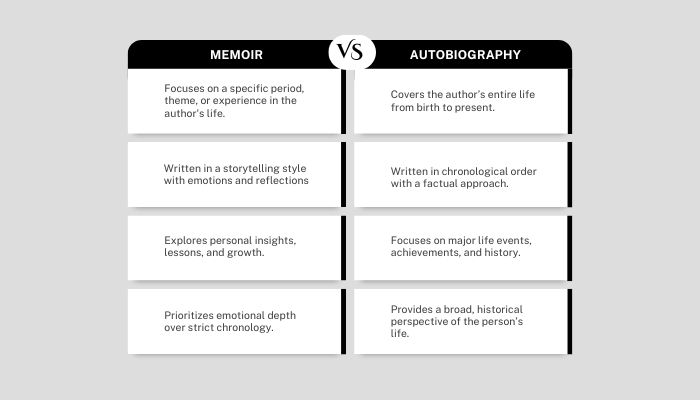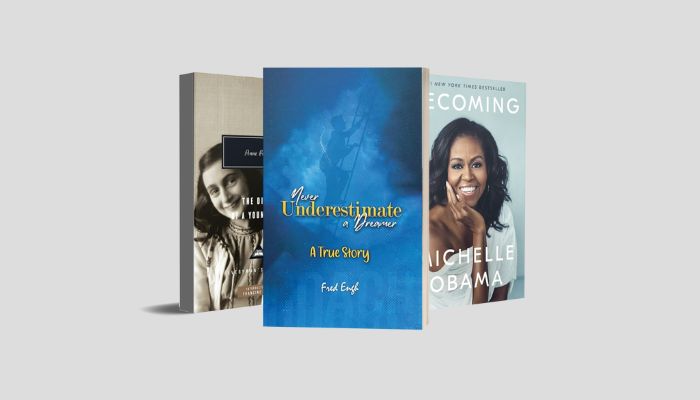A memoir is a unique form of literature that blends personal storytelling with factual experiences. Unlike a standard autobiography, which details an entire life, a memoir focuses on a specific period, theme, or journey in the author’s life. But why are memoirs so popular?
Readers are drawn to memoirs because they offer raw, unfiltered human experiences. They allow us to step into someone else’s world, see life through their eyes, and often find pieces of ourselves in their stories. Whether it’s overcoming adversity, self-discovery, or historical insights, memoirs leave a lasting impact on both the writer and the reader.
By the end of this guide, you’ll have a clear understanding of the memoir definition, what makes a compelling memoir, and even how to write one yourself. You’ll also gain insights into famous memoir examples and the key differences between memoirs and autobiographies.
Memoir Definition: What Is a Memoir?
A memoir is a non-fiction literary work where the author recounts real-life events from their past. The word “memoir” itself comes from the French word “mémoire,” meaning “memory,” which perfectly captures its essence. Unlike a biography or autobiography, which aim to present a full life story, a memoir focuses on a particular theme, period, or set of experiences.
How Is a Memoir Different from an Autobiography?

- Autobiographies provide a comprehensive, chronological account of a person’s life.
- Memoirs focus on personal experiences, emotions, and lessons from a specific period.
For example, Michelle Obama’s Becoming is a memoir that highlights her experiences, values, and growth rather than covering every detail of her life in order.
Characteristics of a Memoir
Memoirs stand out because of their deeply personal and reflective nature. Here are some key characteristics that define them:
- Personal and Reflective Narrative – A memoir dives deep into the author’s thoughts and emotions, creating a strong connection with readers.
- Focus on a Specific Period or Theme – Unlike a biography that spans a lifetime, memoirs concentrate on meaningful experiences that shaped the author’s life.
- First-Person Perspective – Written in the first person, memoirs allow readers to experience events through the author’s eyes.
- Emotional Connection – Readers feel a strong emotional connection with the author’s journey, making the story relatable and impactful.
- Blend of Storytelling and Factual Experiences – While memoirs are based on real events, they use storytelling techniques to make the narrative engaging.
What is The Purpose of a Memoir?
Why do people write memoirs? The reasons vary, but the core purpose remains the same: to share a personal story that resonates with others. Some of the most common themes found in memoirs include:
- Overcoming Challenges – Many memoirs highlight personal struggles and triumphs, offering inspiration to readers.
- Self-Discovery – Authors use memoirs to reflect on their past and make sense of their journey.
- Historical Insights – Some memoirs provide firsthand accounts of historical events, giving readers a personal perspective on history.
- Creating Awareness – Memoirs can shed light on social issues, breaking stigmas and fostering understanding.
For instance, Educated by Tara Westover isn’t just about her childhood; it’s about resilience, identity, and the transformative power of education.
Some of The Best Memoir Books Examples

Some of the most powerful books ever written are memoirs. Here are a few well-known examples:
- Never Underestimate A Dreamer by Fred Engh – A true story written as fiction, following the author’s unwavering pursuit of a dream despite obstacles, as told through the perspective of a boyhood friend.
- The Diary of a Young Girl by Anne Frank – A firsthand account of life during the Holocaust, filled with raw emotion and hope.
- Becoming by Michelle Obama – A journey of personal and professional growth from a former First Lady.
Each of these memoirs captivates readers through honesty, powerful storytelling, and profound messages.
If you’re looking for some incredible memoirs to start with, check out our list of the 10 Best Memoir Books to Read in 2025—each one offering a powerful and unforgettable journey through real-life experiences.
How to Write a Memoir Book
Writing a memoir requires more than just recounting events—it involves storytelling, structure, and authenticity. Here’s how to craft a compelling memoir:
1. Choose a Theme or Focus
Start by identifying the central theme of your memoir. Are you writing about overcoming adversity, a life-changing journey, or a pivotal relationship? Defining your focus will keep your story engaging and meaningful.
2. Structuring the Memoir
Unlike a traditional novel, memoirs don’t always follow a strict chronological order. Here are a few ways to structure your memoir:
- Linear Structure – Telling events in chronological order.
- Thematic Structure – Organizing the memoir around specific themes rather than a timeline.
- Flashback Approach – Weaving past and present moments together for emotional impact.
3. Tips for Making a Memoir Engaging and Authentic
- Show, Don’t Just Tell – Use vivid descriptions and dialogues to bring scenes to life.
- Be Honest – Authenticity is key; don’t shy away from vulnerability.
- Keep It Focused – Avoid unnecessary details; stick to the main story.
- Write with Emotion – The more your readers can feel what you felt, the more memorable your memoir will be.
Memoir vs. Autobiography: What’s the Difference?
While the terms are often used interchangeably, memoirs and autobiographies have distinct differences:
| Feature | Memoir | Autobiography |
| Scope | Focuses on specific themes or events | Covers the entire life |
| Narrative Style | Reflective and emotional | Factual and chronological |
| Tone | Personal and conversational | More formal and objective |
| Examples | Eat, Pray, Love by Elizabeth Gilbert | The Story of My Experiments with Truth by Mahatma Gandhi |
Conclusion
Memoirs are a powerful way to share personal experiences with the world. They go beyond listing events—they provide emotional insight, valuable life lessons, and deep connections with readers. Whether you want to read a compelling memoir or write your own, understanding this genre can enrich your appreciation for storytelling.
Ready to explore memoirs? Pick up a bestselling title or start drafting your own story today! Remember, the best memoirs aren’t just about what happened—they’re about what those experiences meant and how they shaped the author’s life.
